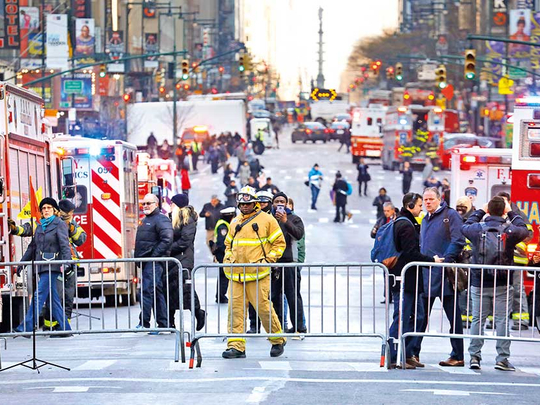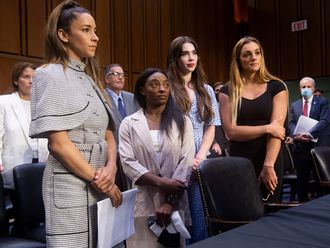
NEW YORK: A would-be suicide bomber’s rush-hour blast in the heart of the New York City subway system failed to cause the bloodshed he intended, authorities said, but it gave new fuel to President Donald Trump’s push to limit immigration.
Akayed Ullah |
Hours after Monday’s explosion in an underground passageway connecting two of Manhattan’s busiest stations, Trump cited the background of the bomber in renewing his call for closer scrutiny of foreigners who come to the country and less immigration based on family ties.
The man arrested in the bombing, Akayed Ullah — who told investigators he wanted to retaliate for American action against Daesh extremists — came to the United States from Bangladesh in 2011 on a visa available to certain relatives of US citizens.
“Today’s terror suspect entered our country through extended-family chain migration, which is incompatible with national security,” Trump said in a statement that called for various changes to the immigration system. Earlier, White House spokeswoman Sarah Huckabee Sanders said Trump’s proposed policies “could have prevented this”.
In a scenario New York had dreaded for years, Akayed Ullah strapped on a crude pipe bomb with Velcro and plastic ties, slipped unnoticed into the nation’s busiest subway system and set off the device, authorities said.
The device didn’t work as intended, authorities said Akayed Ullah, 27, was the only person seriously wounded. But the attack sent frightened commuters fleeing through a smoky passageway, and three people suffered headaches and ringing ears from the first bomb blast in the subway in more than two decades.
Nightmare
“This is one of my nightmares … a terrorist attack in the subway system,” Governor Andrew Cuomo told cable channel NY1. “The good news is: We were on top of it.”
Akayed Ullah was being treated for burns to his hands and abdomen but spoke to investigators from his hospital bed, law enforcement officials said. He was “all over the place” about his motive but indicated he wanted to avenge what he portrayed as US aggression against Daesh, a law enforcement official said.
The officials spoke to AP on condition of anonymity because they were not authorised to speak publicly about the blast.
Akayed Ullah’s low-tech bomb used explosive powder, a nine-volt battery, a Christmas light and matches, the officials said. Investigators said the suspect was seen on surveillance footage igniting the bomb.
In the end, it wasn’t powerful enough to turn the pipe into deadly shrapnel, the officials said.
Law enforcement officials said Akayed Ullah looked at Daesh propaganda online but is not known to have any direct contact with the militants and probably acted alone. Cuomo said there was no evidence, so far, of other bombs or a larger plot. The Democrat said officials were exploring whether Akayed Ullah had been on authorities’ radar, but there was no indication yet that he was.
The attack came less than two months after eight people died near the World Trade Centre in a truck attack that, authorities said, was carried out by an Uzbek immigrant who admired the Islamic State group.
Since 1965, America’s immigration policy has centred on giving preference to people with advanced education or skills, or people with family ties to US citizens and, in some cases, legal permanent residents. Citizens have been able to apply for spouses, parents, children, siblings and the siblings’ spouses and minor children” the would-be immigrants are then screened by US officials to determine whether they can come.
Trump’s administration has called for a “merit-based” immigration system that would limit family-based green cards to spouses and minor children.
‘Deeply saddened’
Akayed Ullah lived with his father, mother and brother in a Brooklyn neighbourhood with a large Bangladeshi community, residents said. He was licensed to drive a livery cab between 2012 and 2015, but the licence was allowed to lapse, according to law enforcement officials and New York City’s Taxi and Limousine Commission.
His family was “deeply saddened” by the attack but also “outraged by the way we have been targeted by law enforcement,” the family said in a statement sent by the New York Chapter of the Council on American-Islamic Relations. A teenage relative was pulled out of class and questioned in school without a parent, guardian or lawyer, the statement said.
Bangladesh’s government condemned the subway attack.
“Bangladesh is committed to its declared policy of ‘Zero Tolerance’ against terrorism, and condemns terrorism and violent extremism in all forms or manifestations anywhere in the world, including Monday morning’s incident in New York City,” the South Asian nation’s government said in a statement.
Security cameras captured the attacker walking casually through a crowded passageway when the bomb went off around 7.20am. A plume of white smoke cleared to show the man sprawled on the ground and commuters scattering.
Port Authority police said officers found the man injured on the ground, with wires protruding from his jacket and the device strapped to his torso. They said he was reaching for a cell phone and they grabbed his hands.
The last bomb blast in the subway system was believed to be in December 1994, when an explosive made from mayonnaise jars and batteries wounded 48 people in a car in lower Manhattan. Prosecutors said unemployed computer programmer Edward Leary set off the explosion to try to extort $2 million (Dh7.34 million) from the city’s transit agency” he claimed insanity. He was convicted of attempted murder and sentenced to 94 years in prison.












